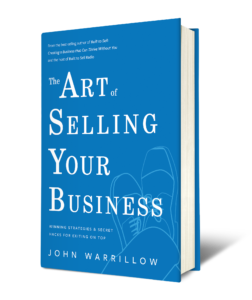The Psychology of Selling – Are You Sure You’re Ready?

More than likely, selling your business is one of the biggest decisions of your life. Unless you own a business, it is impossible to understand just how all-encompassing of a process it can be. With that stated, it is important for business owners to step back and seriously reflect on whether or not they are truly ready to sell. The psychological aspects of selling are not trivial. Various aspects must be taken into consideration before initiating the process to sell.
There are many reasons why it is vital to step back and think about whether or not you are really ready to sell your business. Far too many business owners believe they are ready to sell, only to discover (much too late) that an executed sale is not optimal for their plans.
Selling When There is No Other Choice
Selling a business because there is no other choice, such as situations concerning failing health, personal issues or problems with a business partner, isn’t a true choice at all. In this situation, the psychology of selling is essentially irrelevant, as you have one option, namely, to sell.
The Case of Burnout
In other cases, owners eventually hit a brick wall and have no choice but to consider selling. As burnout sets in, owners may feel that the time is right to “hang up their hat” and put their business up for sale. However, as the process evolves, even those experiencing some level of burnout can discover that they are not emotionally or psychologically ready to sell. In many cases, people make this realization only once it is too late.
Take the Time for Self-Reflection
Quite often, a company becomes interwoven into a business owner’s sense of self, sense of place in the world and even, to an extent, sense of self-worth and identity. When business owners are unaware of this fact, it can be something of a shock to their system to begin the sales process. Many people simply are unaware of the strong hold that their business has on them.
Owners need to invest some time in self-reflection and ask four key questions: Do I really want to sell? If the answer is yes, then why do I want to sell? Will I regret selling once my business is sold? What will I do after I have sold my business? Answering these questions involves far more than evaluating your business. They also involve diving into emotional issues that could be central to your future.
Are You Really Ready to Sell?
One of the best ways of determining whether you are ready to sell, and preparing your business for that potential sale, is to work with a business broker or M&A advisor. Business brokers are experts at helping business owners deal with every aspect of the process of selling a business. They can act as experienced guides that can use that experience and expertise to help you determine if you are truly ready to sell.
If it turns out that you are indeed ready to sell, a brokerage professional can help you prepare so that you can achieve the best price possible once your business hits the market.
Copyright: Business Brokerage Press, Inc.
The post The Psychology of Selling – Are You Sure You’re Ready? appeared first on Deal Studio – Automate, accelerate and elevate your deal making.



















